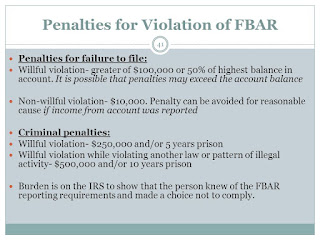In a memorandum to Tax Advocate Service (TAS) employees, the TAS has stated that the IRS will temporarily decertify taxpayers with open TAS cases. Decertification means that taxpayers with seriously delinquent tax debts will, temporarily, not be at risk of having their passports revoked by the State Department merely because of those seriously delinquent tax debts.
IRC Sec. 7345 authorizes (but does not require) the IRS to certify a taxpayer's seriously delinquent tax debt to the State Department for the purposes of passport denial, limitation, or revocation. A seriously delinquent tax debt is an assessed individual tax liability exceeding $50,000 (adjusted for inflation) for which either a notice of federal tax lien has been filed or a levy has been made. IRS must also send a decertification to the Department of State where the certification was in error or where there is no longer a seriously delinquent tax debt. (Code Sec. 7345(b))
The Internal Revenue Manual provides details as to how the IRS certifies and decertifies a taxpayer. (IRM 13.1.24) A decertification protects the taxpayer's passport from being denied, limited, or revoked.
The National Taxpayer Advocate (NTA) has long advocated to exclude certain taxpayers with TAS cases from passport certification.
TAS has now issued a memorandum to its employees. In it, TAS notes that the IRS Commissioner, Charles Rettig, has not made a final decision on what the NTA has been advocating for. But he has agreed to temporarily suspend TAS cases from the certification program. Effective July 25, 2019, all open TAS cases with a certified taxpayer will be systemically decertified. New TAS taxpayers will also be systemically decertified.
TAS will not incorporate this guidance into the next revision of IRM 13.1.24 as the IRS Commissioner's decision is temporary. New guidance will be issued once the IRS Commissioner makes a final decision on this issue.
Once You’ve Resolved Your Tax Problem With The IRS, The IRS Will Reverse The Certification Within 30 Days Of Resolution Of The Issue And Provide Notification To The State Department As Soon As Practicable.
The IRS Will Reverse The Certification Within 30 Days Of Resolution Of The Issue And Provide Notification To The State Department As Soon As Practicable.
WHO CAN AFFORD TO BE WITHOUT THEIR PASSPORT FOR AT LEAST 30 DAYS?
Travel
If you’re leaving in a few days for international travel, need to resolve passport issues and have a pending application for a U.S. passport, you should call 888 8TaxAid immediately. If you already have a U.S. passport, you can use your passport until you’re notified by the State Department that it has been revoked.
If your passport is cancelled or revoked, after you’re certified, you must resolve the tax debt by paying the debt in full, making alternative payment arrangements or showing that the certification is erroneous.
The IRS will reverse your certification within 30 days of the date the tax debt is resolved and provide notification to the State Department as soon as practicable.
WHO CAN AFFORD TO BE WITHOUT THEIR PASSPORT FOR
AT LEAST 30 DAYS?
Those who discover they have not been in compliance with their US tax obligations, including filing of income tax returns or FBAR reports, may avail themselves of the IRS Streamlined Offshore Procedure, which does not include the draconian FBAR penalty for Non-US Domiciliary's.
If You Face This Problem, You Should Consult with Experienced Tax Attorneys, As There Are Several Ways Taxpayers Can Avoid Having the IRS Request That the State Department Revoke Your Passport.
Want To Keep Your US Passport?
Contact the Tax Lawyers at
Marini & Associates, P.A.
for a FREE Tax Consultation Contact us at:
Toll Free at 888-8TaxAid (888)882-9243.





















